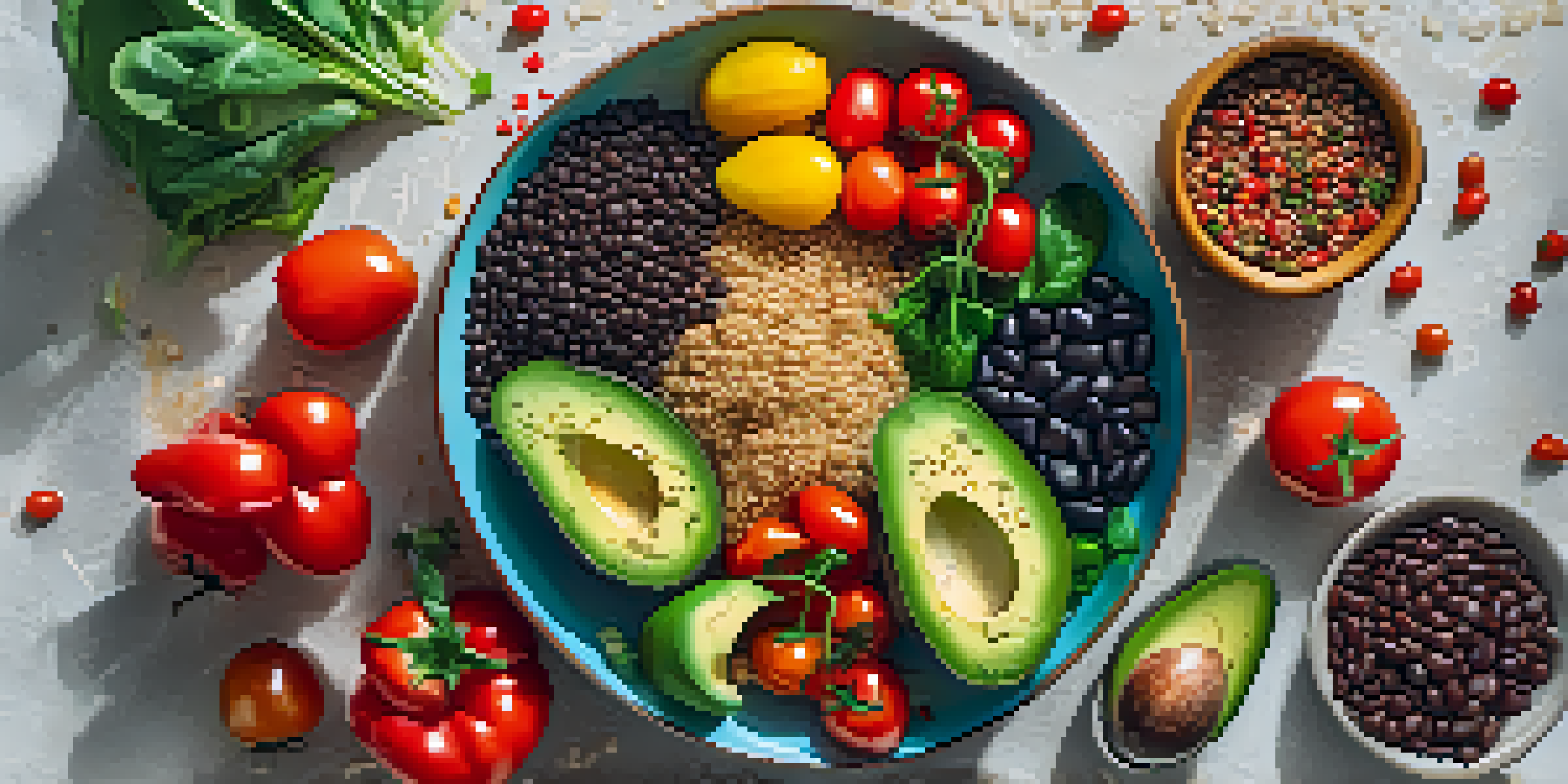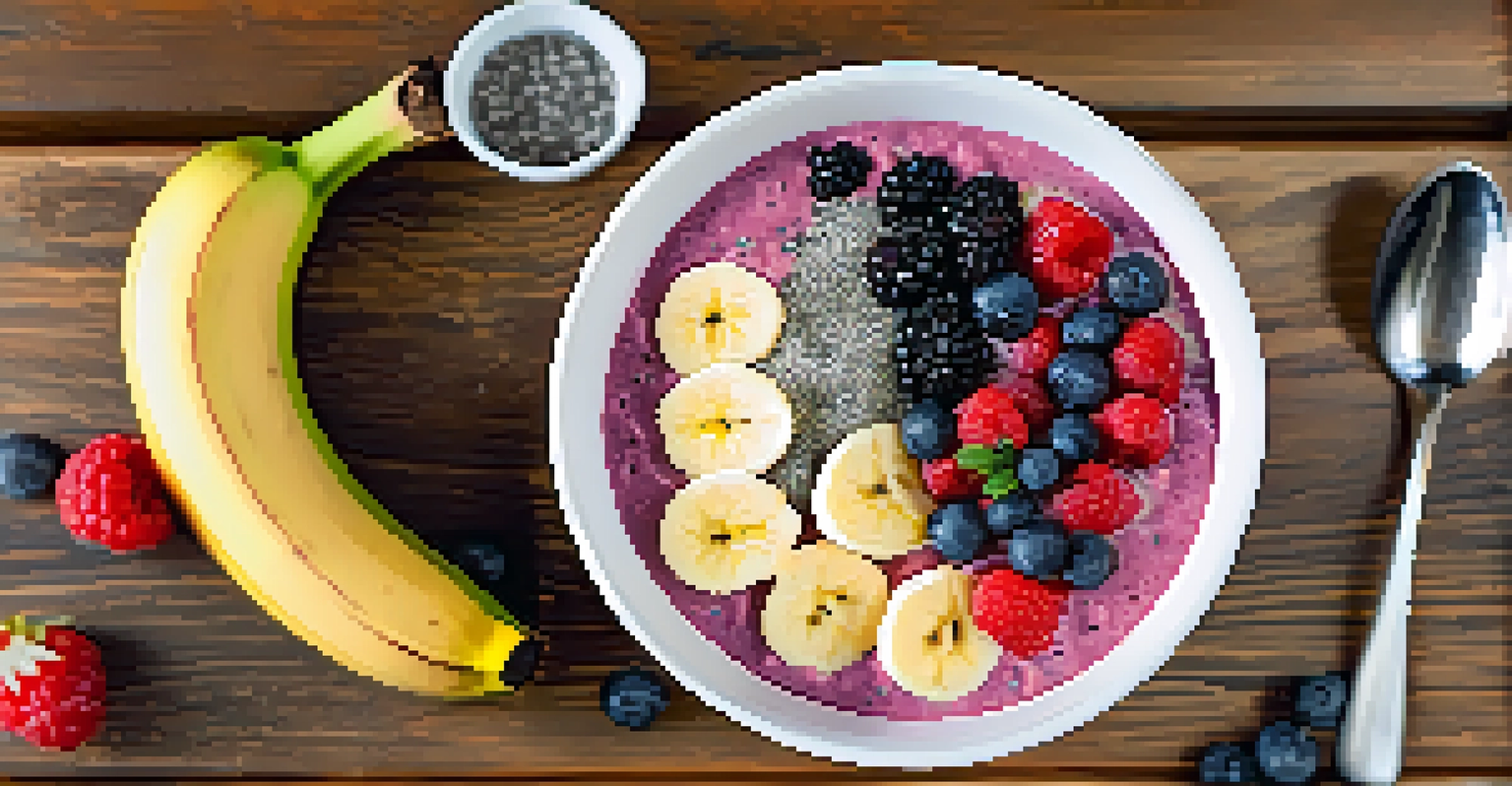The Role of Carbohydrates in a Vegan Athlete's Diet

Understanding Carbohydrates and Their Types
Carbohydrates are one of the three macronutrients our bodies need, alongside proteins and fats. They come in two main forms: simple and complex. Simple carbohydrates, like sugars found in fruits, provide quick energy, while complex carbs, like whole grains and legumes, offer sustained energy release.
Carbohydrates are the body's primary source of energy and are essential for optimal performance, especially in athletes.
For vegan athletes, understanding the types of carbohydrates is crucial for performance. Simple carbs can be beneficial before a workout for a quick energy boost, while complex carbs are better suited for overall daily energy needs and recovery post-exercise. This balance helps in enhancing endurance and overall athletic performance.
Incorporating a variety of carbohydrate sources ensures a well-rounded nutrient profile. This means opting for foods like quinoa, brown rice, beans, and starchy vegetables, which not only provide energy but also come packed with vitamins and minerals essential for recovery and health.
Why Carbohydrates Are Crucial for Athletes
For athletes, carbohydrates serve as the primary fuel source during exercise. When you engage in physical activity, your body breaks down carbohydrates into glucose, which powers your muscles. Without sufficient carbs, an athlete may experience fatigue and decreased performance.

Vegan athletes, in particular, need to ensure they consume enough carbohydrates to meet their energy demands. A well-planned vegan diet can provide ample carbs through fruits, vegetables, grains, and legumes, which is essential for maintaining energy levels during training and competition.
Carbs Fuel Athletic Performance
Carbohydrates are crucial for athletes as they serve as the primary fuel source during exercise, helping to maintain energy levels and optimize performance.
Moreover, carbohydrates play a vital role in recovery after intense workouts. Consuming carbs post-exercise helps replenish glycogen stores in muscles, enabling athletes to bounce back more quickly for their next training session.
How Much Carbohydrate Do Vegan Athletes Need?
The carbohydrate needs of vegan athletes can vary based on their activity level, size, and specific training goals. Generally, athletes should aim for about 3 to 7 grams of carbohydrates per kilogram of body weight each day, depending on their training intensity. This amount can help sustain energy levels and optimize performance.
The right balance of carbohydrates, proteins, and fats is critical for an athlete's success and overall health.
For example, a 70 kg vegan athlete might require anywhere from 210 to 490 grams of carbohydrates daily. This may seem daunting, but when you consider all the carbohydrate-rich foods available, reaching these targets becomes more manageable. Foods like pasta, rice, fruits, and oats can all contribute significantly.
It's also important to listen to your body. If you're feeling fatigued or noticing performance dips, it may be time to reassess your carbohydrate intake. Keeping a food journal can help track how your energy levels correlate with your diet, offering insights into your specific needs.
The Best Sources of Carbohydrates for Vegan Athletes
Vegan athletes have a plethora of carbohydrate sources to choose from. Whole grains like brown rice, quinoa, and oats are not only rich in carbs but also provide fiber, which aids digestion. In addition, starchy vegetables like sweet potatoes and corn are excellent options that offer both energy and nutrition.
Fruits are another fantastic source of carbohydrates, packed with natural sugars and vitamins. Bananas, apples, and berries are not only delicious but also convenient pre-workout snacks. They provide quick energy and help keep hydration levels up with their high water content.
Vegan Athletes Need Sufficient Carbs
Vegan athletes should aim for 3 to 7 grams of carbohydrates per kilogram of body weight daily to meet their energy demands and enhance recovery.
Legumes, such as lentils and chickpeas, are also carbohydrate-rich and offer the added benefit of protein and fiber. Incorporating a variety of these sources into daily meals can help ensure that vegan athletes meet their carbohydrate needs while enjoying a diverse and balanced diet.
Timing Carbohydrate Intake for Optimal Performance
Timing your carbohydrate intake can significantly impact performance and recovery. Consuming carbs before a workout can provide the necessary fuel for exercise, while post-workout carbs help in recovery. Ideally, athletes should focus on eating a balanced meal containing carbohydrates a few hours before training.
After a workout, it’s recommended to consume carbohydrates within 30 minutes to two hours to maximize glycogen replenishment. This is when your muscles are most receptive to nutrients, and a meal or snack combining carbs and protein can enhance recovery.
For instance, a smoothie with banana and spinach or a bowl of oatmeal with fruits can serve as great options to fuel up before or after workouts. Incorporating these strategies helps vegan athletes maintain energy levels and improve overall performance.
Common Misconceptions About Carbohydrates
There are many misconceptions surrounding carbohydrates, often painting them as the enemy of health and fitness. In reality, carbohydrates are essential, especially for athletes who require energy for high-intensity training. Eliminating carbs can lead to fatigue, decreased performance, and hindered recovery.
Another myth is that all carbohydrates are bad, which couldn't be further from the truth. Whole, minimally processed carbohydrates provide not only energy but also essential nutrients. It's the refined carbs, like white bread and sugary snacks, that should be consumed in moderation.
Balance Carbs with Other Nutrients
A well-rounded vegan diet should include not only carbohydrates but also adequate protein and healthy fats to support overall health and athletic performance.
Understanding that carbohydrates are not the enemy allows vegan athletes to embrace a varied diet. By focusing on whole food sources, they can enjoy the benefits of carbs while also fueling their bodies for peak performance.
Balancing Carbs with Other Nutrients
While carbohydrates are vital, a balanced diet for vegan athletes should also include adequate protein and healthy fats. Protein is essential for muscle repair and growth, while fats provide a concentrated source of energy. This balance helps in optimizing overall health and performance.
Incorporating a variety of foods ensures that all nutrient needs are met. For example, a meal with quinoa (carbs), black beans (protein), and avocado (healthy fat) not only tastes great but also provides a well-rounded nutritional profile.

Additionally, paying attention to micronutrients, such as vitamins and minerals, is crucial. Foods like leafy greens, nuts, and seeds can complement a vegan athlete’s diet, ensuring they receive a broad spectrum of nutrients necessary for overall wellness and peak performance.